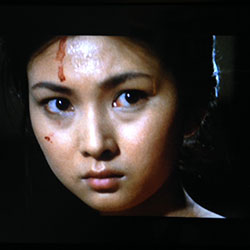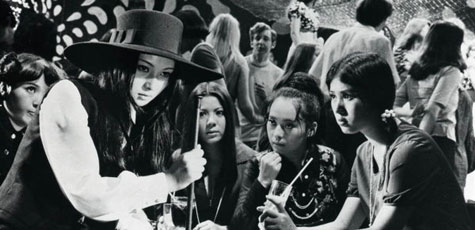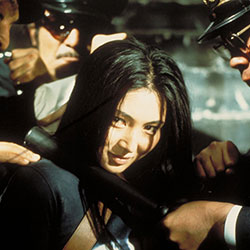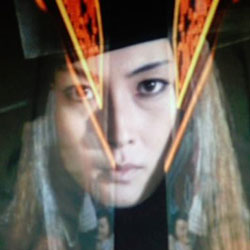
I have to preface the following appreciation of Meiko Kaji’s acting career with two disclaimers:
- This is in no way meant to be a comprehensive overview of the Japanese actress’s work in the movies.
- I am not going to use this space to write about her singing, although that body of work is definitely worthy of consideration (Tarantino fans reading this are likely familiar with her songs that appear on the Kill Bill soundtracks).
All I’m after here is to say a few things about Kaji’s acting in general, and then highlight a dozen of what I see as some of her most significant movie roles, including her performances in a few series of films that did much to establish her cinematic identity.
Meiko Kaji is a badass. She’s a strikingly beautiful woman, but she’s nobody’s pretty plaything. Call her Japan’s answer to Pam Grier. In the roles discussed below, sometimes she’s a member (always the leader) of a gang, sometimes she’s a lone-wolf vigilante, and other times she’s an assassin; but she’s always a hard-edged, fearless person who doesn’t suffer fools gladly.
To a great extent, the force of her personality, as seen in these characters, is conveyed simply by her stare. In her acting, Kaji has a way of fixing a threatening, icy gaze on the characters who get on her bad side—this intense look much more of a clear and menacing warning than any words could convey.
So, onto those roles:
Blind Woman’s Curse (1969)
 In Kaji’s first lead part, she plays the head of a Yakuza gangster outfit—a status she inherited from her deceased father. She (people just call her “Boss”) would like for her gang to reform in a way that would have them be less violent than in their past, but a troublemaking rival group and a devious traitor within her outfit’s own ranks force her to ultimately declare an all-out turf war against her nemeses.
In Kaji’s first lead part, she plays the head of a Yakuza gangster outfit—a status she inherited from her deceased father. She (people just call her “Boss”) would like for her gang to reform in a way that would have them be less violent than in their past, but a troublemaking rival group and a devious traitor within her outfit’s own ranks force her to ultimately declare an all-out turf war against her nemeses.
This film makes some confusing jumps in its plotline and sometimes can’t seem to decide whether it wants to be a serious crime thriller or a slapstick comedy; yet all of that incongruity is somehow charming. Kaji’s soon-to-be signature stare is in full abundance here, director Teruo Ishii clearly recognizing the photogenic force in her unblinking, intimidating gaze.
Stray Cat Rock Series (1970-71)
This is a series in a loose sense. Some of the same actors appear in a few or all of the five films involved, but as different characters in the various titles. What binds the quintet together (besides the series heading and the presence of Kaji and some of the other regulars) is that they were all made for the same company (Nikkatsu), were filmed by only two directors (Yasuhara Hasebe and Toshiya Fuhita), and they all involve streetwise, wayward youth existing on the fringes of society.
As noted below, some of these films are more enjoyable than others, but they all offer some level of entertainment; and, taken together, they helped to establish Kaji’s on-screen personality.
Delinquent Girl Boss
Kaji is Mei, the leader of an all-girl gang. Mei and her friends’ wild good times are threatened by an opposing pack of tough girls, and a male-dominated, organized crime group with whom those chicks are in cahoots.
The focal point of the story is a boxing match engaged in by a male friend of Mei’s troupe. The syndicate has arranged a fix in which the guy would purposely lose for their monetary gain, but Mei and the girls urge him to try to win the bout, even if this will create a street war.
Psychedelic music, arty cinematography, knife fights, and more give this highly enjoyable film a hard-edged, experimental feel.
Wild Jumbo
Kaji is C-Ko, the lone female constituent of a group of youths who are at loose ends and out for illicit kicks. C-Ko and her pals are bothered by a religious group who is aggressively opposed to their way of life.
A young woman, who used to belong to the sect but has become disenchanted with them, joins C-Ko’s gang and helps them plan to rob her former group of a mass of donations they will collect at a festival for their believers. The characters of this film are entertaining and the heist provides some suspense, but overall this title is not as compelling as its predecessor.
Sex Hunter

In a return to the quality level of Delinquent Girl Boss, Kaji is again the leader of a pack of tough young girls. Her character, Mako, and her friends are initially chummy with a gang of hardnosed males who call themselves the Eagles; but when the Eagles get too involved in deciding what guys Mako and her pals can get with, the girls declare independence—igniting mayhem.
Kaji’s hard stare is put into full use over the course of this razor sharp tale. Some happening music, including a philosophical lovers’ ballad sung as a duet by Mako and her guy friend, is a big plus in this ace film.
Machine Animal
Kaji is Maya, top lady in a band of rowdy, defiant girls. Some out-of-town “rednecks” arrive in Yokohama, where Maya and her friends live, looking to sell the 500 hits of LSD they’re carrying around. Maya and her pack mess with the fellas at first, but then become sympathetic to them and work to help broker their acid-selling deal.
But the shady nature of the buyers they find, and some deceit within Maya’s group, endanger this transaction. There are some fun scenes in this, and there’s a gorgeous existential lament sung by Kaji, but the plot is forced.
Beat ‘71
Kaji’s role in this title is a precursor to her character in her next series. She is Furiko, a Tokyo denizen who is framed for a killing actually committed by her boyfriend. After spending two years in prison, Furiko makes a jailbreak and heads to the remote seaside town that is her boyfriend’s home, where she knows he has returned.
But, in the way of their reunion is the guy’s crooked politician father and his henchmen, and it’s up to a pack of Furiko’s hippie friends from the city to try and help her against these forces. This is the weakest title in the series, but one plus is a groovy scene featuring Japanese psychedelic rock band The Mops.
The Sasori/Female Prisoner Scorpion Series (1972-73)
The Stray Cat Rock movies are hardly family friendly entertainment, but in comparison to the four Female Prisoner Scorpion films in which Kaji starred, those titles look like campy child’s play. Based on a manga comic by Toru Shinohara, the first three of these were directed by Shunya Ito, and the final one by Yasuhara Hasebe—who was the maestro behind some of the Stray Cat Rock movies.
The Female Prisoner Scorpion films were a leap for Kaji in terms of her on-screen prominence. While she always played a lead role in the Stray Cat Rock stories, in those films she was one main character among others; in the Female Prisoner Scorpion releases, she is the character around which all of these titles revolve.
This is a true series, as Kaji portrays the same person—Nami Matsushima, who is usually called Matsu—in all of the titles. Matsu is a headstrong and independent young woman who is often and violently wronged by authority figures and other persons who enter her life.
She has both the smarts and the physical ability to defend herself against these unjust acts visited on her; she rarely speaks, yet has no trouble letting her thoughts and feelings be known when the need arises; and she is nicknamed Sasori (Scorpion) by her jailhouse peers.
Alienated from most of society (although intensely loyal to the few she considers friends), she generally acts as a vigilante, working on her own, outside of recognized law but by a set of personally developed ethics.
Female Prisoner #701: Scorpion
 This is both a woman-in-prison story and a revenge tale.
This is both a woman-in-prison story and a revenge tale.
Three years before the present, Matsu was used and violated by her then boyfriend—a crooked narcotics officer—and a Yakuza outfit with whom he colluded. She attempts to get revenge, but they see that she is sent off to prison.
Most of the film occurs in jail, where Matsu is misused by a variety of people in a variety of ways. She must accept the brutality in the moment and simply await her opportunities for revenge. This film is explosively sexual and violent, edgy from the opening scene to the climax, and a superb start to the series.
Jailhouse 41
The normally solitary Matsu forms a temporary sisterhood with six other female prisoners when they all escape together. The open adventures of these women, who have all previously been wronged by men in various ways, constitute most of the story.
There’s a brief subplot involving supernatural doings, this segment bringing the film its wildest and most visually stunning moments. Otherwise, there’s all manner of violence—that’s hard to watch at times and outrageously entertaining at others—and plenty of Meiko Kaji staredowns. Just a notch below Scorpion in overall quality.
Beast Stable
A fugitive from justice living in the city, Matsu attempts to lead a “normal” life. She gets a job as a seamstress and rents an apartment, but a peaceful existence is difficult when you’ve got the police after you and you have to deal with aggravations such as come-ons from a lecherous neighbor.
Moreover, Matsu gets into a war with the members of a prostitution ring run by one of her former prison adversaries: a set of challenges daunting even to someone as smart and strong as Scorpion. An excellent crime film and, like the others in the series, not meant for the faint of heart.
Grudge Song
 Again on the run from the authorities, Matsu is rescued and befriended by a sympathetic man who has his own reasons for hating the cops. They seem like an apt pair to join forces in battle against the sadistic police boss who is hot to nail both of them—and maybe they could even be lovers.
Again on the run from the authorities, Matsu is rescued and befriended by a sympathetic man who has his own reasons for hating the cops. They seem like an apt pair to join forces in battle against the sadistic police boss who is hot to nail both of them—and maybe they could even be lovers.
But does the resolutely solitary Matsu really want to be held to an interpersonal bond, and can she actually trust this guy, when all men have ever done to her is deceive and abuse her? Less gory than the other Scorpion titles, yet equally as intense, the finale in this series reaches the same high quality level as its predecessors.
The Lady Snowblood Films (1973-4)

This series includes two titles directed by Toshiya Fujita and starring Kaji in what is perhaps her most iconic role. These are historical crime thrillers—the first of which was an influence on Tarantino’s Kill Bill saga. The pair has been issued together in a Criterion DVD edition.
Lady Snowblood
In 1873, a team of four opportunists, exploiting the upheaval of the Meiji Restoration for personal gain, murder an innocent schoolteacher and gang rape his wife. The victimized widow later murders the member of the pack who forces her to live with him after all of that.
Imprisoned, the woman makes a point of becoming pregnant. She dies shortly after giving birth, but while still alive, she makes arrangements for the child to become a trained assassin who will forsake personal emotions in a single-minded quest to bring blood-soaked vengeance to the remaining three members of the offending group.
Kaji is that child—Yuki Kashima, later dubbed Lady Snowblood—who, at age 20, is prepared mentally and physically to realize her sword-wielding destiny. Narrated historical lessons offset gory bloodbaths in what is the most powerful of the films under discussion here.

Love Song of Vengeance
The sequel takes place shortly after the Russo-Japanese War of 1904-05. In the wake of her vengeance spree, Yuki is captured by police, sent to the same Tokyo prison in which she was born, and sentenced to death by hanging.
She is rescued en route to her execution, but her “savior” is actually an agent of the secret police, who wants to set Lady Snowblood after an anarchist who is making trouble for the government.
Will she serve those who have come to power, or defend the agitators and the downtrodden who have been left behind? Another fine movie, although not quite a classic on par with the first Lady Snowblood film.
Brian Greene writes short stories, personal essays, and feature articles and reviews on/of books, music, and film. His work has appeared in over 25 publication since 2008. He has also written about crime fiction and films for Noir Originals, Paperback Parade, Mulholland Books, Crime Time, Crimeculture, Stark House Press, and The Life Sentence. Brian lives in Durham, North Carolina. He can be found on Twitter @brianjoebrain

Anyone with an interest in Meiko Kaji should check out this fan site:
http://www.meikokaji.net/